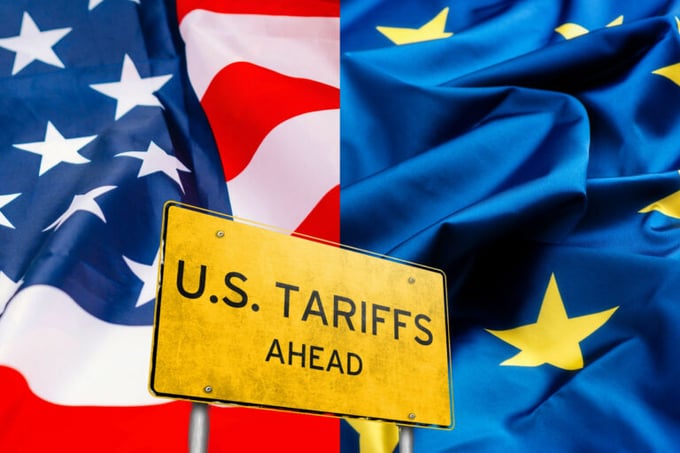November 26, 2025 | 05:09 GMT +7
November 26, 2025 | 05:09 GMT +7
Hotline: 0913.378.918
November 26, 2025 | 05:09 GMT +7
Hotline: 0913.378.918
A recent RaboResearch report highlights that these tariffs could have far-reaching consequences, particularly affecting agricultural machinery and processed consumer foods.

Tariffs threaten not only the trade relationship between the EU and the US, according to senior specialist food & agriculture for RaboResearch, Barend Bekamp. Photo: Canva.
Given the EU’s substantial trade surplus with the US, multiple areas within the food and agriculture industry may feel the impact, affecting farmers, food processors, and equipment manufacturers. The tariffs might lead to increased costs for EU products in the US market, potentially altering competitive dynamics and market access for European agricultural exports. These proposed tariffs could alter trade dynamics not only between the US and EU but also globally, impacting trade flows with other countries.
US-EU agricultural trade dynamics
While the EU is largely self-sufficient in agricultural products, exporting relatively small surpluses globally (a significant portion destined for the US), the EU relies heavily on imports of soy and soy products, primarily sourced from the US and Brazil.
The EU enjoys a substantial trade surplus with the US in food and agriculture. In 2024, the EU exported some €38 billion worth of products, compared to €14 billion in imports from the US. This surplus, reports RaboResearch, is driven by the export of high-value products like essential oils, wine, olive oil, and dairy, while the US exports lower-value commodities.
Senior specialist food & agriculture for RaboResearch, Barend Bekamp, noted: “From the EU’s point of view, the US is a major trade partner, mainly serving as an important export market rather than a supplier. From the US perspective, the EU is more significant as a supplier than as an export destination. The US market is more crucial to EU food and agriculture companies than the EU market is to US companies,” explains.
Industries hit the hardest
The industries most susceptible to US tariffs are those heavily reliant on the American market and sensitive to price changes. According to RaboResearch’s analysis, the agricultural machinery sector is expected to be hit the hardest. US farmers, facing tight margins, may opt for domestic products over EU imports subject to tariffs.
Meanwhile, processed consumer food products, including dairy, beverages and pasta, might experience a medium impact, the extent of which would depend on the price elasticity of demand within these sectors. Sectors like animal protein, fertilizers, and sugar, where the US is not a major market, are likely to see minimal impact. Products with low price elasticity can absorb tariff costs through higher prices.
How can EU companies respond?
According to Bekamp, EU companies can consider several strategies in response to potential tariffs. Options include maintaining prices and shifting costs to US importers, reducing prices to remain competitive, withdrawing from the US market, redesigning supply chains to bypass tariffs, or investing in US-based production. The best option, said Bekamp, would typically depend the price demand elasticity of its products and its international footprint.
“Tariffs threaten not only the trade relationship between the EU and the US,” Bekamp noted. “Canada, Mexico and Brazil also face US-imposed tariffs and are likely to retaliate. This could result in a complex web of regional and sectoral interactions that significantly transform global trade dynamics.”
PW

(VAN) An Giang promotes supply-demand connections, standardizes quality and builds value chains, creating a foundation for sustainable bird’s nest development and aiming to expand exports.
/2025/11/24/5339-4-nongnghiep-075331.jpg)
(VAN) Recently, the conference on 'Sustainable Fisheries Linkage Chain - Tilapia for Export' took place in Tien Hai commune, Hung Yen province.
/2025/11/21/4309-2-153400_128.jpg)
(VAN) Green and low-emission rice is paving the way for Vietnamese rice to enter high-end markets, marking the beginning of a transformation journey toward greening and elevating the national rice brand.

(VAN) ‘Right to Win’ outlines a national action plan that shapes a new vision for Viet Nam’s agriculture in an era of renewal and global integration.

(VAN) Lam Dong’s farmed sturgeon output this year is expected to reach 2,300 tons, worth VND 450 billion, affirming the brand’s position on the market.

(VAN) A surge in Ukrainian egg exports, largely driven by soaring sales to the UK over the last few years, has notably pushed up egg prices on the domestic market.

(VAN) The price of Arabica Catimor coffee in Quang Tri is currently at VND 25,000–27,000/kg (fresh cherries), the highest level ever recorded